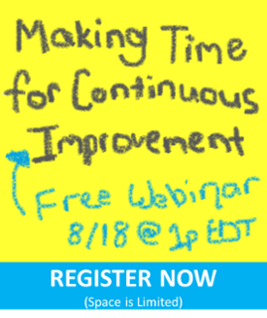More than fifty years ago, on May 25, 1961, President John F. Kennedy gave a historic speech before a joint session of Congress that set the United States on a course to the moon. He famously said, “I believe that this nation should commit itself to achieving the goal, before this decade is out, of landing a man on the moon...”
The next part of the sentence is the part that is often left out when quoting from this important speech. “…and returning him safely to the Earth.”
Ah yes, it’s one thing to do the trick, it’s an entirely different thing to stick the landing. But that’s what NASA did, and that’s what other high reliability organizations (HROs) do every day.
This week (July 20th) we are celebrating the anniversary of the first moon landing (and safe return) predicted by President Kennedy. I don’t know about you, but I’m thinking a lot about what it means to be an HRO, and how this enabled NASA to pull off the moon landing - and safe return of the astronauts.
A high reliability organization (HRO) is one that regularly succeeds in avoiding catastrophes despite a high level of risk and complexity. HROs include airlines, the military, and nuclear power plants, among others. Many healthcare organizations are working hard to become HROs. Despite countless opportunities for failure, HROs most often succeed. How?
Process failures are addressed immediately and completely
Some organizations can ignore or work around small process failures or deviations. HROs can’t. What seems like a small problem today could grow into a problem that puts lives at stake. HROs take any level of technical or human failure seriously. In fact, in an HRO even potential process breakdowns are identified and addressed. While not all HROs are dealing with literal rocket science and moon landings, they all have their own processes that are just as mission critical.
Complex problems get complex solutions
HROs are reluctant to simplify. They understand that their operations are complicated and that sweeping generalizations don’t work. When looking to resolve a problem or identifying opportunities for improvement, HROs seek root causes, not easy fixes, because they know that those easy fixes could result in even larger problems in the future.
Every voice matters
Every single person in a HRO is in the position to help communicate the current situation, identify potential trouble and improve the organization. Leaders of HROs call this willingness to place trust in front line employees “sensitivity to operations." From astronauts and nurses to mechanics and engineers, front line employees in HROs are encouraged to speak up with problems and make improvements.
Recovery is swift
Resilience is essential for HROs. Mistakes do happen, sometimes many at one time, so HROs must be quick to respond, improvise, and innovate. They prepare in advance for emergencies and have clear means of communication and control.
Experts are trusted
In an HRO, expertise trumps title. Leaders at high reliability organizations listen to people who have the most developed knowledge of the task at hand. They know that on-the-ground subject matter experts are essential for urgent situational assessment and response. The org chart is less important than the know-how.
HROs making time for continuous improvement, and you can too. Register for this free upcoming webinar to find out how.



Add a Comment